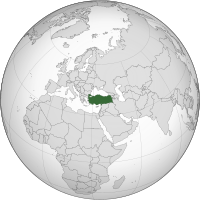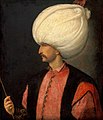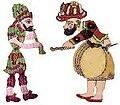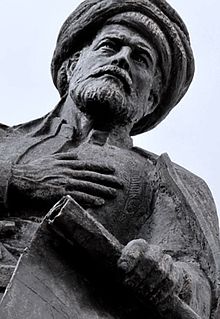Portal:Turkey
Merhaba! Türkiye portalına hoşgeldiniz. Hi! Welcome to the Turkey portal.
 | |

| |
Turkey, officially the Republic of Türkiye, is a country mainly in Anatolia in West Asia, with a smaller part called East Thrace in Southeast Europe. It borders the Black Sea to the north; Georgia, Armenia, Azerbaijan, and Iran to the east; Iraq, Syria, and the Mediterranean Sea (and Cyprus) to the south; and the Aegean Sea, Greece, and Bulgaria to the west. Turkey is home to over 85 million people; most are ethnic Turks, while ethnic Kurds are the largest ethnic minority. Officially a secular state, Turkey has a Muslim-majority population. Ankara is Turkey's capital and second-largest city; Istanbul is its largest city, and its economic and financial center, as well as the largest city in Europe. Other major cities include İzmir, Bursa and Antalya.
Human habitation began in the Late Paleolithic. Home to important Neolithic sites like Göbekli Tepe and some of the earliest farming areas, present-day Turkey was inhabited by various ancient peoples. Hattians were assimilated by the incoming Anatolian peoples. Increasing diversity during Classical Anatolia transitioned into cultural Hellenization following the conquests of Alexander the Great; Hellenization continued during the Roman and Byzantine eras. The Seljuk Turks began migrating into Anatolia in the 11th century, starting the Turkification process. The Seljuk Sultanate of Rum ruled Anatolia until the Mongol invasion in 1243, when it disintegrated into Turkish principalities. Beginning in 1299, the Ottomans united the principalities and expanded; Mehmed II conquered Istanbul in 1453. During the reigns of Selim I and Suleiman the Magnificent, the Ottoman Empire became a global power. From 1789 onwards, the empire saw major transformation, reforms, and centralization while its territory declined.
In the 19th and early 20th centuries, persecution of Muslims during the Ottoman contraction and in the Russian Empire resulted in large-scale loss of life and mass migration into modern-day Turkey from the Balkans, Caucasus, and Crimea. Under the control of the Three Pashas, the Ottoman Empire entered World War I in 1914, during which the Ottoman government committed genocides against its Armenian, Greek and Assyrian subjects. After its defeat, the Ottoman Empire was partitioned. The Turkish War of Independence resulted in the abolition of the sultanate in 1922 and the signing of the Treaty of Lausanne in 1923. The Republic was proclaimed on 29 October 1923, modelled on the reforms initiated by the country's first president, Mustafa Kemal Atatürk. Turkey remained neutral during most of World War II, but was involved in the Korean War. Coups in 1960 and 1980 interrupted the transition to a multi-party system.
Turkey is an upper-middle-income and emerging country; its economy is the 18th- or 11th-largest in the world. It is a unitary presidential republic. Turkey is a founding member of the OECD, G20, and Organization of Turkic States. With a geopolitically significant location, Turkey is a regional power and an early member of NATO. An EU-candidate, Turkey is part of the EU Customs Union, CoE, OIC, and TURKSOY. Turkey has coastal plains, a high central plateau, and various mountain ranges; its climate is temperate with harsher conditions in the interior. Home to three biodiversity hotspots, Turkey is prone to frequent earthquakes and is highly vulnerable to climate change. Turkey has universal healthcare, growing access to education, and increasing innovativeness. It is a leading TV content exporter. With 21 UNESCO World Heritage sites, 30 UNESCO intangible cultural heritage inscriptions, and a rich and diverse cuisine, Turkey is the fourth most visited country in the world. (Full article...)
Selected article -
General images
Did you know -
- ... that Denis Legerský was allowed to play for the Turkish national ice hockey team in a friendly match in 2014, even though he is a Slovak citizen? (April 11, 2014)
- ... that Turkish Prime Minister Adnan Menderes survived the 1959 Turkish Airlines Gatwick crash almost uninjured, but was executed by hanging a year and a half later? (January 5, 2008) Wikipedia:Recent additions 198
- ... that women's football forward Seyhan Gündüz was capped 32 times internationally, scoring 12 goals, a rate of 0.375 a match? (January 28, 2014)
- ... that the relics housed within the chapel near the Church of St. Mary of Blachernae in Istanbul were credited by the Byzantines for victories against the Avars, Arabs, and Rus? (July 15, 2008)
- ... that Istanbul University Professor Semavi Eyice is regarded as the pioneer of Byzantine studies in Turkey? (April 27, 2012)
- ... that female karateka Yıldız Aras holds more World, European, and Mediterranean Games champion titles than any other Turkish sportsperson? (November 8, 2009) Wikipedia:Recent additions 250
- ... that although banned in 1943, the Baklahorani carnival, in Istanbul, revived after nearly 70 years? (January 19, 2012)
Selected picture
Selected biography -
Ahmed Muhiddin Piri (c. 1465 – 1553), better known as Piri Reis (Turkish: Pîrî Reis or Hacı Ahmet Muhittin Pîrî Bey), was an Ottoman navigator, geographer and cartographer. He is primarily known today for his maps and charts collected in his Kitab-ı Bahriye (Book of Navigation), a book that contains detailed information on early navigational techniques as well as relatively accurate charts for their time, describing the important ports and cities of the Mediterranean Sea.
He gained fame as a cartographer when a small part of his first world map, prepared in 1513, was discovered in 1929 at the Topkapı Palace in Istanbul. His world map is the oldest known Turkish atlas showing the New World, and one of the oldest maps of America still existing anywhere (the oldest known surviving map of America is the map drawn by Juan de la Cosa in 1500). Piri Reis's map is centered on the Sahara at the latitude of the Tropic of Cancer. (Full article...)Selected video -
Selected quote -
| “ | Today the Soviet Union is a friend and an ally. We need this friendship. However, no one can know what will happen tomorrow. Just like the Ottoman and Austro-Hungarian Empires it may tear itself apart or shrink in size. The people that it holds so tightly in its grip may one day slip away. The world may see a new balance of power. It is then that Turkey must know what to do. Ally Soviets have under their control our brothers with whom we share language, beliefs and roots. We must be prepared to embrace them. Being ready does not mean that we will sit quietly and wait. We must get ready. How does a people get prepared for such an endeavour? By strengthening the natural bridges that exist between us. Language is a bridge... Religion is a bridge... History is a bridge... We must delve into our roots and reconstruct what history has divided. We can't wait for them to approach us. We must reach out to them. | ” |
Recognized content
Provinces
Related portals
Religions in Turkey
Neighbouring countries
Countries with related heritage
WikiProjects
Turkish wikipedia
 |
There is a Turkish version of Wikipedia, the free encyclopedia. |
Wikimedia
The following Wikimedia Foundation sister projects provide more on this subject:
-
Commons
Free media repository -
Wikibooks
Free textbooks and manuals -
Wikidata
Free knowledge base -
Wikinews
Free-content news -
Wikiquote
Collection of quotations -
Wikisource
Free-content library -
Wikiversity
Free learning tools -
Wikivoyage
Free travel guide -
Wiktionary
Dictionary and thesaurus














































































































